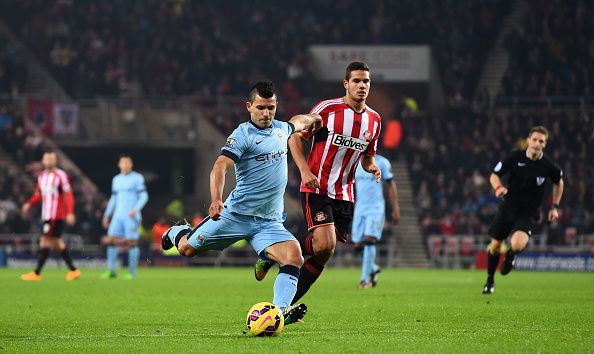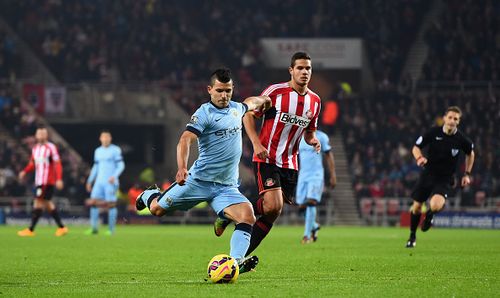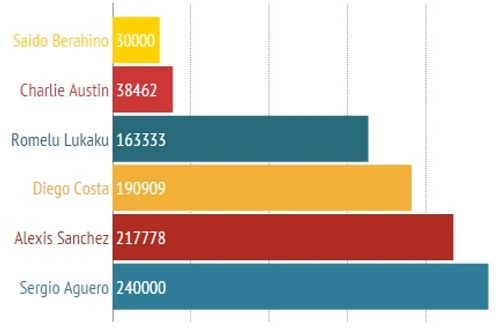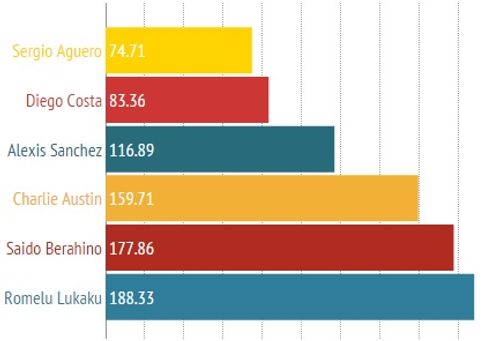
The math behind scoring goals in the Premier League: Who is the most cost-effective striker?

A football club is either successful or financially successful. And once in a blue moon, it can be both. The success depends on the number of trophies and fan following which in turn depends on the players. There are numerous numbers that are taken into account before a player is considered. One of those is the analysis of the amount of money spent.
To give a glimpse of how clubs look at players, let’s start with the most attractive players on the field these days, top scorers in the Barclays Premier League (EPL).
When scoring goals becomes a costlier affair
The most lucid and conventional way of analysing players is by looking at goals scored, wages paid and minutes played. Post the 14th week, it seems that big EPL clubs paid hefty amounts of money to their players for each goal they scored, whereas the opposite was true for the “not so wealthy” clubs.
Starting from the most cost effective, the in-form 21-year-old West Brom-striker Saido Berahino scored 7 goals, each valued at a cost of £30,000 to the club. The second most economical scorer is Charlie Austin; the QPR forward has scored (7) half of the total goals (14) the club has scored, taking merely £8,462 more than Berahino for every goal he scored.

Everton’s costliest signing ever did not turn out to be a fairy tale; Romelu Lukaku scored 6 times and was paid £163,333 per goal scored. Heading towards the rich clubs, Chelsea has one of the most rare-successful striker acquisitions in the form of the former Atletico Madrid frontman Diego Costa who has already scored 11 goals. The Blues paid Costa £190,909 per goal.
Arsenal has always had good deals with Barcelona, Alexis Sanchez is no different. The third highest scorer in EPL scored 9 goals and the Gunners paid £217,778 per goal. Lastly, Man City’s Sergio Aguero who found the net 14 times in EPL was paid the most for each goal he scored. City’s cost per goal scored by Aguero was £240,000 – almost equivalent (£231,795) to Berahino, Austin and Lukaku together.
These bars indicate that players from the not so lucrative clubs are cost effective and make every penny count. However, does this tell the tale? Of course not! Let’s take another dimension as to how efficient these strikers are on the field.
Analyzing the most effective striker and cost to the club
This dimension is about how much time these top strikers take to find the net. Deducing from the amount of time taken to score a goal turn the tables around; the costliest players become the most efficient. Highly paid Aguero took 74.71 mins to score a goal whereas Costa took just about 9 minutes more for every goal, thanks to Cesc Fabregas who just can’t stop assisting goals this season.

Arsenal’s in-form Sanchez took 116.89 mins per goal. And as we look to relatively smaller clubs, Charlie Austin’s average stood at 159.71 minutes where as Berahino took 177.86 minutes for each goal scored. To end with, the most inefficient goal return came from Lukaku who took about more than two games to score a goal.
These analyses reveal a crucial part of how players are valued or talent is spotted. Manchester City’s Aguero is paid highest of them all but took the lowest time to score, whereas the likes of the economical duo of Berahino and Austin took more than double the time as compared to the efficient Aguero.
Since the money involved in the game of football has shot up substantially, the risk associated and the returns matter even more. In football, time matters more than money does and hence City is more successful than QPR or West Brom. Ergo, analysing the player by the above dimensions will be an injustice.
However it will be interesting to compare La Liga players to reflect the true state of efficacy of the clubs as well as the players.
Note: Stats till Gameweek 14 have been considered